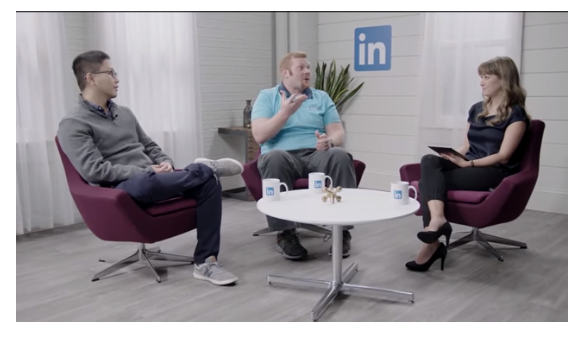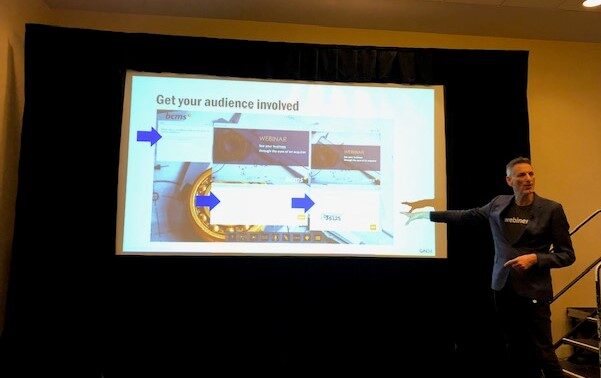Think about it. Do you enjoy being marketed to?
As marketers, we love our jobs; we love marketing. But like anyone else, it’s safe to say that we don’t enjoy receiving cold pitch emails, or downloading gated white papers, or spotting that “Request a Demo” ad for the 10th time.
As Mark Bornstein, Vice President of Content Marketing at ON24, said during his Keys to Engagement Driven Webinars session at MarketingProfs B2B Marketing Forum 2018, we’ve a reached a tipping point.
While the channels have changed, marketers are still very much relying on passive tactics that simply don’t engage. Modern audiences want to learn, but they also want to be inspired. And our professional expectations are very much evolving alongside our personal lives. With the Netflix model, we can choose to consume the content we want, when we want to.
So the question is: How can brands create content that prospects “want” to consume and engage with?
Mark says webinars are the ultimate engagement channel. And as it turns out, 66% of buyers say they prefer webinars to any other content formats, according to the 2018 Content Preferences Survey Report.
Webinars are certainly not new to marketing, but it’s time to re-think how we build them and use them. With these key elements, webinars can go beyond the “talking power point” and drive interactivity, engagement, and conversion.
5 Key Elements of the Engagement Driven Webinar
#1 – Branded Experience
Yes, your webinar slides probably have your logo and use the typical brand sanctioned fonts and color pallette. However, your webinar experience, should integrate with your emails, website, mobile apps, and the list goes on. Mark suggests including campaign images, taglines, and visuals to create a compelling and brand immersive content experience.
#2 – Multimedia Experiences
We’re just beginning to duplicate TV-like experiences with marketing, and webinars are a great way to create conversations over presentations. Think about how many of us tuned in day after day to watch Oprah having conversations on stage. Would we have watched if she was flipping through slides from off camera?
An example of an innovative webinar experience is Live with Marketers from *LinkedIn, a digital talk show experience.

One tip for creating engaging conversations is to build or leverage an existing brand personality. Find someone you can put in front of the camera that the audience can connect with and wants to watch. Then build your series around that individual.
#3 – Human Engagement
In order to drive true brand engagement and affinity, the most important thing you can do is drive audience members to take action while experiencing your content. Calling or incentivizing the audience to ask questions, tweet, download content, or respond to live polls creates a more immersive experience.
Webinars don’t have to require audience members to passively listen in while checking emails. The more you can encourage engagement, the more your audience will connect with your content and brand.
#4 – Multi-Touch Content Experiences
Historically, marketers have found webinars can effectively move a prospect more quickly through the buyer’s journey by creating a multi-touch content experience. But typically, the page where the webinar lives doesn’t offer other types of content for people to engage with.
Creating on-page links to relevant content and via nurtures following the event allows you to engage prospects further. Don’t be afraid to distract your audience from the webinar itself; allowing them to choose the content experience they want to pursue, models the personal experience of on demand content binging.
Types of content you can link to from your webinar page includes:
- Resources (e.g. white papers as supporting content)
- Links to other relevant web pages, blogs, or events
- Other upcoming webinars
#5 – Turning Webinar Engagement into Data That Converts
If you’ve engaged your audience during the webinar via polls, questions, and content downloads, you have some awesome inside info about your audience. And you can turn those webinar insights into email nurtures or they can be passed to the sales team. Knowing a prospects’ hottest questions or pain points, opens the door to a great sales experience for your internal team and the prospect.
What’s Next in Webinar Marketing
For brands where webinars are creating impact, many are already looking toward the next thing. Mark suggests we’ll start to see more brands offering:
- On-demand webinars for content binging: Webinar gateways allow you to get more mileage out of your content and the user to select the content that works the best for them.
- Creating targeted experiences: Account-based marketing (ABM) efforts can be extended to your webinar marketing via recording specific webinars for target accounts or vertical, targeted on-demand landing pages, and so on.
Regardless of the form, content that drives visitors to consume for longer periods of time and meaningfully interact indicates a more enjoyable, persuasive, and ultimately impactful content experience. .
Are you using webinars to connect with your audience now? Tell us in the comments section below.



